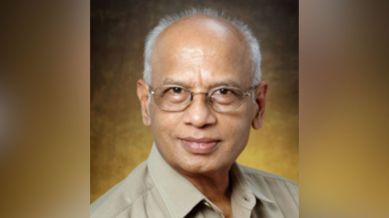Anonna Dutt is a Principal Correspondent who writes primarily on health at the Indian Express. She reports on myriad topics ranging from the growing burden of non-communicable diseases such as diabetes and hypertension to the problems with pervasive infectious conditions. She reported on the government’s management of the Covid-19 pandemic and closely followed the vaccination programme. Her stories have resulted in the city government investing in high-end tests for the poor and acknowledging errors in their official reports. Dutt also takes a keen interest in the country’s space programme and has written on key missions like Chandrayaan 2 and 3, Aditya L1, and Gaganyaan. She was among the first batch of eleven media fellows with RBM Partnership to End Malaria. She was also selected to participate in the short-term programme on early childhood reporting at Columbia University’s Dart Centre. Dutt has a Bachelor’s Degree from the Symbiosis Institute of Media and Communication, Pune and a PG Diploma from the Asian College of Journalism, Chennai. She started her reporting career with the Hindustan Times. When not at work, she tries to appease the Duolingo owl with her French skills and sometimes takes to the dance floor. ... Read More
Dr MS Valiathan, creator of home-grown, low-cost heart valve, leaves behind a legacy of innovation
Top cardiologist and innovator of indigenous medical devices dies at 90

When cardiac surgeon and innovator, Dr MS Valiathan, developed a low-cost, mechanical heart valve, the idea was born out of desperation as he operated on patients with limited government funding. The founder director of the Sree Chitra Tirunal Institute for Medical Sciences and Technology (SCTIMST) and the first Vice-Chancellor of Manipal Academy of Higher Education (MAHE), who died on Wednesday night at 90, showed how ingenuity could challenge the impossible.
The tradition of biomedical innovation continues at SCTIMST that he founded, which is supported by the Department of Science and Technology. Dr Ranjan Shetty, head of interventional cardiology at Manipal Hospital, Bengaluru, said, “I remember him doing various drawings of a mechanical valve to replace the damaged one. So when he developed one at the Sree Chitra Institute, it was among the first of Made in India medical devices that offered a cheap and effective option to patients of rheumatic valve disease, which damages heart valves caused by one or several episodes of rheumatic fever and infection. He was the first in India to research on this topic. He designed the valve completely from scratch and as trial after trial got stuck with longevity of the material used, he finally adapted a material used in spacecraft. He went on to develop vascular grafts and blood bags with a certain design so that the blood wouldn’t clot. All of these are commercially available and continue to help patients.”
Dr Valiathan also took a keen interest in Ayurveda, seeing it as a complementary discipline, and learnt Sanskrit to access the knowledge in traditional texts. “He went on to write three textbooks on Ayurveda in English. He was always interested in the science behind it and was working on developing an Ayurvedic therapy for heart failure,” said Dr Vivek Pillai, head of cardiac surgery at SCTIMST.
Born in Kerala, Dr Valiathan was one of the students from the first batch to graduate from Trivandrum Medical College. Without ever witnessing a surgery, he became interested in it after reading a collection of essays by British surgeon Sir William Heneage Ogilvie in his first year of medical training. He went on to train as a surgeon from University of Liverpool and did his fellowship with the Royal College of Surgeons of Edinburgh and England. After a brief stint at PGIMER-Chandigarh, where he realised general surgery was a shrinking field, he decided to specialise as a cardiac surgeon. He went on to receive training at Johns Hopkins University UK and Georgetown University Hospital USA.
After spending 12 years in the UK and US, Valiathan decided to return, taking up an ad hoc job at Safdarjung Hospital and working as a consultant for a honorarium of Rs 200 at Railway Hospital, Chennai.
But then he received an offer from the government of Kerala that changed everything. A building had been gifted to the government by the Maharaja of Travancore, which was to be developed as a hospital for specialities. It eventually became SCTIMST. In a post, author Manu S Pillai recalled how Dr Valiathan put up a portrait of the older Maharani although a lawsuit had concluded that the building belonged to the Maharaja’s son from the younger Maharani. But since the older Maharani had lived there, Dr Valiathan showed his respect.
After 20 years at SCTIMST, he joined as the first VC of MAHE. “He was an inspiring orator. We were all amazed by his memory, clarity of thought and articulation. Although I came to the institute much after he left, the spirit of innovation he instilled here continues,” said Dr Pillai. A Padma Vibhushan, he also received the highest award for physicians, the Dr BC Roy Award.